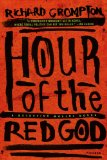Summary | Excerpt | Reviews | Beyond the book | Read-Alikes | Genres & Themes | Author Bio

A Novel
by Malla NunnMalla Nunn's experience as a filmmaker shines through her debut novel, the
first in a planned series. Her penchant for story-telling and poignant dialogue
keep the reader captivated through this suspenseful thriller. Detective Sergeant
Emmanuel Cooper is sent to investigate the murder of white policeman Captain
Pretorius in the racially divided town of Jacob's Rest, in the North-East of
South Africa (map) close to the Mozambique border. Set in 1952, just after the
institution of new apartheid laws, the story is mired in racial complexity. Nunn
explores the deep layers of tension stewing among the black, colored and
Afrikaner residents, adding to the pot Jews, Englishmen and Dutchmen as further
complicating factors to blur the line between the oppressed and the oppressors.
Detective Cooper steals our hearts from the first, and has us desperate for his
triumph until the very last page. His intelligence, dry sense of humor, trustworthiness and upright morals assure us that his path is the right one. On his side is Shabalala, the native policeman and childhood
friend of the murdered Captain Willem Pretorius, who exposes the reader to Zulu
history and customs, adding richness to the story. Nunn is clearly very familiar
with her subject, making for a novel that is equally as informative as it is
riveting and controversial. Another sympathetic character is the old Jewish
doctor Daniel Zweigman, enigmatic yet ultimately genuine. He, too, offers us a
glimpse inside another world, with bitter tastes of his former life of abuse
under the Nazi regime.
Nunn's villains are as fully developed as her protagonists. Piet and Dickie,
sent from the Security Branch of the National Party to override Cooper's
authority on the murder investigation, aren't strong or smart enough to thwart
Cooper's efforts toward righteousness, but they certainly give him a run for his
money. The Captain's hefty, muscular sons, too, wield physical dominance over
Cooper, throwing many obstacles in his path.
The novel's intricately woven plot leaves no leaf unturned, so that the
conclusion is believable and narratively satisfying, unlike many mystery stories
in which the reader must suppress the urge to shout at the author about suspects
left untried or threads left unfollowed. The ease with which Nunn ties in other
cultures, including languages, solidifies the realistic nature of the book in a
positive way. The foray into Mozambique provides particularly vibrant images of
the scenery and inhabitants, and mouth-watering descriptions of the food.
By the book's end, readers will find themselves as deeply entwined in the
characters' fates as Nunn is herself, and left to ruminate over a number of
weighty debates as the tale weaves in double standards, double lives, emotional
betrayal, murder, corruption and sexual deviance.
Coming Soon: Let the Dead Lie (April 2010)
The Apartheid Laws at Play in A Beautiful Place to Die
Prohibition of Mixed Marriages Act, Act No 55 of 1949
Prohibited marriages between white people and black or colored people of
other races. Between 1946 and 1949 only 75 mixed marriages were recorded,
compared with 28,000 white marriages in total.
Immorality Amendment Act, Act No 21 of 1950
Prohibited adultery, attempted adultery or related immoral acts (such as
extra-marital sex) between white and black or colored people.
Population Registration Act, Act No 30 of 1950
Instituted a national register in which every individual's race was
recorded. In addition, a Race Classification Board was designed in order to make
the final sign-off in disputed cases.
Suppression of Communism Act, Act No 44 of 1950
Outlawed communist activity and the Community Party in South Africa.
Natives (Abolition of Passes and Co-ordination of Documents) Act, Act No 67
of 1952
This act forced black people to carry identification with them at all times,
including a photograph, place of origin, employment record, tax payments, and
any encounters with the police. It was considered a criminal offense to be
caught without these papers.
Reservation of Separate Amenities Act, Act No 49 of 1953
Forced racial segregation in all public amenities, buildings and transport.
The goal was to limit contact between differing races, and highly favored the
quality of whites' facilities over blacks' and coloreds'. The thoughts behind
this law were just beginning to form when Nunn's book takes place, resulting,
for example, in the separate rooms for sorting mail in the post office.
![]() This review was originally published in The BookBrowse Review in January 2009, and has been updated for the
November 2009 edition.
Click here to go to this issue.
This review was originally published in The BookBrowse Review in January 2009, and has been updated for the
November 2009 edition.
Click here to go to this issue.

If you liked A Beautiful Place to Die, try these:

by Linda Castillo
Published 2014
An extraordinarily beautiful Amish woman, a dangerous femme fatale, is the central figure in a story that reveals a dark side of Painters Mill and its seemingly perfect Amish world.

by Richard Crompton
Published 2014
The Maasai believe in two gods. Enkai Narok, the Black God, is benign. Enkai Nanyokie, the Red God, is the god of anger, vengeance, and death.
I have lost all sense of home, having moved about so much. It means to me now only that place where the books are ...
Click Here to find out who said this, as well as discovering other famous literary quotes!
Your guide toexceptional books
BookBrowse seeks out and recommends the best in contemporary fiction and nonfiction—books that not only engage and entertain but also deepen our understanding of ourselves and the world around us.